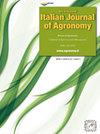黑麦(Secale cereale L.)和四叶草(Trifolium squarrosum L.)覆盖作物混作死地膜可提高其化感作用
IF 2.1
3区 农林科学
Q1 AGRONOMY
引用次数: 6
摘要
覆盖作物是农业生态系统中减少对合成投入品的依赖和相关环境风险的重要工具。覆盖作物除了对土壤肥力有好处外,还可以通过其竞争和化感作用来控制杂草。通过室内和田间试验,研究了黑麦(Secale cereale L.)和方玫瑰三叶草(Trifolium squarrosum L.)两种覆盖作物单独或混合对耕地杂草种子萌发和生长的化感作用。对两种覆盖作物的水提取物及其混合物进行了加拿大Conyza canadensis (L)的生物测定。、逆行苋和马地黄吟游诗人。水提取物的体外效果随覆盖作物和杂草种类的不同而呈剂量依赖性变化。三种提取物均能显著降低逆转录黄芽的萌发率(-87%)。黑麦和混合提取物对所有杂草根生长的抑制作用在51% ~ 82%之间。黑麦提取物对加拿大姜和血根草的茎长减少效果最好(- 39% ~ 44%),而四叶草对弯叶草的茎长减少效果最好(-79%)。植物提取物还能延缓杂草的萌发时间,对加拿大草种子有显著影响。在田间试验中,尽管耕作在减少杂草密度方面更有效,但与对照区相比,覆盖作物秸秆作为绿肥对杂草的抑制作用不显著。覆盖作物混合覆盖对杂草出苗率的控制显著优于单一覆盖。覆盖作物秸秆的化学特征表明,其茎部和根部均含有丰富的化感物质酚酸和类黄酮,这些物质通过缓慢分解可能成为潜在的天然除草剂。从水提取物的分析来看,其他未分析和/或未确定的水溶性化感化合物应该是体外观察到的植物毒性的基础,至少对黑麦来说是这样。对覆盖作物混合物,根据化学特征和田间数据,讨论了植物材料之间的正相互作用导致化感物质更好的释放和除草效果。我们的研究显示了覆盖作物的化感作用及其根据种植系统需要纳入杂草管理策略的潜力。需要进一步的试验来确认覆盖作物残茬在田间条件下的性能。黑麦和四叶草是具有潜在化感作用的覆盖作物。-在体外生物测定中,黑麦、方玫瑰三叶草及其混合物残留物的水萃取物降低和/或减缓了A. retroflexus和C. canadensis的杂草萌发。-水提物对倒立草、加拿大草和血根草的根和茎的生长均有抑制作用,不同浓度的残基不同。在田间条件下,黑麦和四叶草混合覆盖对杂草的抑制效果优于单一覆盖。本文章由计算机程序翻译,如有差异,请以英文原文为准。
Rye (Secale cereale L.) and squarrose clover (Trifolium squarrosum L.) cover crops can increase their allelopathic potential for weed control when used mixed as dead mulch
Cover crops are essential tools in agroecosystems for reducing the reliance on synthetic inputs and associated environmental risks. Alongside their benefits to soil fertility, cover crops can control weeds by their competitive and allelopathic attributes. Laboratory and field experiments were conducted to assess the allelopathic potential of two cover crop species, rye (Secale cereale L.) and squarrose clover (Trifolium squarrosum L.), alone or in mixture, on seed germination and growth of arable weeds. Aqueous extracts of the two cover crops and their mixture were tested in a bioassay on Conyza canadensis (L). Cronq., Amaranthus retroflexus L. and Digitaria sanguinalis (L.) Scop. In vitro effects of aqueous extracts varied in a dose-dependent manner, with cover crops and weed species. All three extracts were able to reduce the germination of A. retroflexus (-87%) considerably. Inhibitory effects by rye and mixture extracts on radicle growth of all weed species ranged between 51 and 82%. Rye extract was the best at reducing shoot length of C. canadensis and D. sanguinalis (-39 to 44%), while squarrose clover was more effective on A. retroflexus (-79%). Plant extracts also delayed the germination time of weed species with substantial effect of the mixture on C. canadensisseeds. In the field experiment, no significant weed suppression was provided by cover crop residues incorporated as green manure compared to control plots, despite tillage being more effective in reducing weed density. Still, the cover crop mixture mulch controlled weed emergence significantly better than single cover crop mulches. The chemical characterization of cover crop residues, both shoots and roots, revealed a notable richness of allelopathic phenolic acids and flavonoids, that through slow decomposition may constitute potential natural herbicides. From the analysis of the aqueous extracts, other non-analyzed and/or unidentified water-soluble allelopathic compounds should underlie the phytotoxicity observed in vitro, at least for rye. For cover crop mixture, positive interactions among plant materials leading to a better release of allelochemicals and weeding effectiveness are discussed according to chemical profiles and field data. Our study demonstrated the allelopathic activity of the cover crops and their potential to be included in weed management strategies according to cropping system needs. Additional trials are needed to confirm the performance of cover crop residues under field conditions.
Highlights
- Rye and squarrose clover are cover crops with potential allelopathic effects.
- Aqueous extracts of residues of rye, squarrose clover and their mixture reduced and/or slowed weed germination of A. retroflexus and C. canadensis in in vitro bioassays.
- The aqueous extracts, depending on the concentration of residues, had inhibitory effects on radicle and shoot growth of A. retroflexus, C. canadensis and D. sanguinalis.
- Under field conditions, mulch of a mix of rye and squarrose clover suppressed weeds better than the single species.
求助全文
通过发布文献求助,成功后即可免费获取论文全文。
去求助
来源期刊

Italian Journal of Agronomy
AGRONOMY-
CiteScore
4.20
自引率
4.50%
发文量
25
审稿时长
10 weeks
期刊介绍:
The Italian Journal of Agronomy (IJA) is the official journal of the Italian Society for Agronomy. It publishes quarterly original articles and reviews reporting experimental and theoretical contributions to agronomy and crop science, with main emphasis on original articles from Italy and countries having similar agricultural conditions. The journal deals with all aspects of Agricultural and Environmental Sciences, the interactions between cropping systems and sustainable development. Multidisciplinary articles that bridge agronomy with ecology, environmental and social sciences are also welcome.
 求助内容:
求助内容: 应助结果提醒方式:
应助结果提醒方式:


